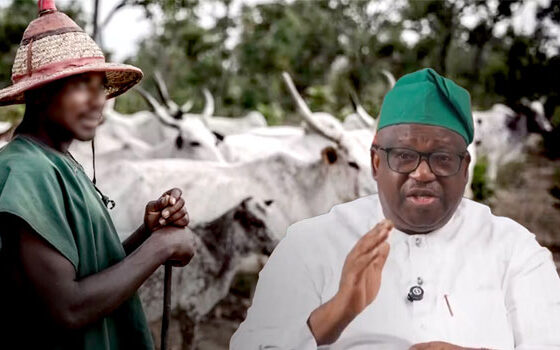Share the post "Killings: Gov Mutfwang Bans Night Grazing In Plateau, Restricts Motorcycles"
The governor also prohibited the transportation of cattle by vehicles after 7pm.
Plateau State Governor, Caleb Mutfwang, has announced a ban on night grazing and restricted the use of motorcycles across the state following incessant attacks.
In a state broadcast on Wednesday, Mutfwang described the attacks as “coordinated acts of terror” aimed at displacing residents and undermining their right to exist peacefully on their ancestral lands.
The governor also prohibited the transportation of cattle by vehicles after 7pm.
He said the directives take immediate effect, with the restriction on motorcycle use in place from 7pm to 6am across the state until further notice.
“The tragic echoes of Dogo Na Hawa, Riyom, Barkin-Ladi, Mangu, and the Christmas Eve massacres in Bokkos remain vivid. The cycle continues, but it must not endure. Enough Is Enough,” the governor said.
“As your governor, I stand resolved — Plateau shall not be overrun by fear, nor shall we accept this culture of bloodshed as the new normal.
“My administration is intensifying efforts to protect our people and enforce the rule of law across all local governments.
“I hereby announce the following measures, effective Wednesday, April 16: Night grazing of cattle is strictly prohibited; transportation of cattle by vehicle is banned after 7pm.
“The use of motorcycles is restricted from 7pm to 6am across the state until further notice.”
Muftwang said communities must be actively involved in defending themselves within the confines of the law.
At least 50 people were reportedly killed after gunmen invaded Kimakpa village, Miango district, in Bassa LGA of the state on April 14.
The attack came barely two weeks after gunmen killed many residents in five communities in Bokkos and Mangu LGAs.
Authorities have been scrambling to contain the attacks in a state where ethnic tensions have long simmered.
“There was no specific target. They were just shooting,” said Peter John, a survivor from Sunday night’s attack on the village of Kimakpa, some 25 kilometres (15 miles) from the state capital Jos.
John, 25, who spoke to AFP while receiving treatment at a nearby hospital, said he escaped the attackers, who burst into his family’s home around 10:00 pm, by climbing onto the roof.
Sister, brother, nieces killed
His sister and her daughter, as well as his older brother and nine-month-old niece, all died from gunshot and machete wounds as the unidentified men rampaged from house to house.
“They shot and killed my younger sister and her daughter right in front of me,” he said.
Farmers and herders in Plateau have long clashed over access to dwindling pasture and fields in a state ravaged by climate change, illegal mining and land grabs.
The fact that most farmers are Christian and most herders from the Muslim Fulani ethnic group gives the conflict an ethnic and religious dimension.
John and other witnesses told AFP the attackers were speaking the Fulani language.
When local officials made similar remarks in reference to the earlier massacre this month, a local herder’s group denounced the killings — but also said their members were under attack from farmers.
With no reported arrests or proven motive for the assaults, authorities have not been able to explain the recent uptick in violence.
‘Systematic and premeditated campaign’
That has not stopped some politicians from warning of a “genocide” — language that critics say distracts from the larger issue of criminal impunity and lack of government control in the countryside.
“This is not an isolated conflict between farmers and herders,” said Governor Caleb Mutfwang in a speech on Wednesday.
“What we are witnessing is a systematic and premeditated campaign,” he alleged, claiming the killers had outside “sponsors”.
In response to the massacre, Mutfwang banned cattle grazing at night and transporting cattle by vehicle after 7:00 pm. He called on local vigilante groups to “organize night patrols in coordination with the security agencies”.
John said he called a vigilante group on Sunday night — to no avail.
“It was too late,” he told AFP, as his seven-year-old nephew lay in the hospital in deep pain, with severe injuries to his neck and head from a machete.
Earlier in the day, security forces had been present. But they had left before the evening killings started.
He said that prior to the attack, there was another incident in Kimakpa, where security had been provided due to rising insecurity in the area.
“The attackers came, shouting ‘Allahu Akbar’ (‘God is Greater’), and began shooting, killing people, and burning houses,” John said.
Diwe Gado Diwe, 41, whose cousin was killed, described the attack as one of the worst experiences of his life.
He was away from the village when the attackers struck — when his sister called him, he could not return because it was too dangerous.
“She told me not to come,” he told AFP at the hospital, shortly after his brother died in the intensive care unit after being shot and hacked.
“I tried calling the vigilante group, but the line didn’t go through,” said Diwe, who works in neighbouring Bauchi state but was back in the area visiting family.
He was later told that one of the first people killed was a vigilante on patrol.
Jessica John, 45, sat at the bedside of her son, Saryie John, awaiting surgery to remove a bullet lodged in his chest.
Her son, like others, fled the house but returned later with a friend to check on the family.
The friend was shot dead. Saryie John has survived, for now.
Share the post "Killings: Gov Mutfwang Bans Night Grazing In Plateau, Restricts Motorcycles"
